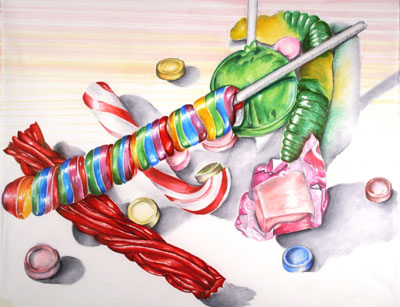All Nonfiction
- Bullying
- Books
- Academic
- Author Interviews
- Celebrity interviews
- College Articles
- College Essays
- Educator of the Year
- Heroes
- Interviews
- Memoir
- Personal Experience
- Sports
- Travel & Culture
All Opinions
- Bullying
- Current Events / Politics
- Discrimination
- Drugs / Alcohol / Smoking
- Entertainment / Celebrities
- Environment
- Love / Relationships
- Movies / Music / TV
- Pop Culture / Trends
- School / College
- Social Issues / Civics
- Spirituality / Religion
- Sports / Hobbies
All Hot Topics
- Bullying
- Community Service
- Environment
- Health
- Letters to the Editor
- Pride & Prejudice
- What Matters
- Back
Summer Guide
- Program Links
- Program Reviews
- Back
College Guide
- College Links
- College Reviews
- College Essays
- College Articles
- Back
Myth or Not? Eating Candy Will Make You Hyperactive
At 19 years old, I can recall the numerous times my younger siblings, and even myself, were told not to eat more candy at birthday parties because we’d get “hyper”. To me that meant we’d get loud and run all over the place, and it seemed logical that sugar accelerated kids, while it slowed adults down. It was a rush that made annoying children into intolerable children. Now that I have this assignment to write, I question this believed fact of mine for the first time. Does sugar really make people hyperactive? I believe it does. I believe sugar alters your system, giving you a “rush”, and then eventually a breakdown. I believe so because I have felt “hyper”, which is my intuitive reaction.
The first peer reviewed article I found at the IU libraries website, talks about a study done on the sugar level intake of Korean fifth graders, to see how it’s related to the Attention Deficit Hyperactivity Disorder (ADHD). Titled “Correlation between attention deficit hyperactivity disorder and sugar consumption, quality of diet, and dietary behavior in school children”, and written by Kim Yujeong in 2011, it says that a “recent study on sugar consumption suggested that higher consumption of sugar is positively correlated with a higher level of hyperactivity” (Yujeong, 2011). So, a study was done, in which “A total of 107 students participated” (Yujeong, 2011), out of which “eight boys and one girl (…) categorized as high risk for ADHD according to diagnostic criteria” (Yujeong, 2011). The group of kids with more risk to ADHD had an intake of Vitamin C much lower than the normal group. Regarding sugar intakes, from snacks, (which “play a critical role in the diets of school-age children”, “students in the normal group consumed 58.4g while the risk group consumed 50.2g” (Yujeong, 2011). Those grams of sugar were actually much higher (12.5% rather than 10% of their sugar intake from snacks (Yujeong, 2011)) than the recommended intake for kids their age. Therefore, “children who consumed les sugar from fruit snacks or whose vitamin C intake was less than RI was at increased risks for AHDH”, says the author. “However, no significant association was observed between total volume of simple sugar intake from snacks and AHDH development” Jujeong, 2011). All of this was supported by research.
The other article, written by Stephen Ray Flora and Courtney Allyn Polenick from Youngstown State University in 2013, is titled “Effects of Sugar Consumption on Human Behavior and Performance”. It states that the belief that “sugar consumption causes behavior problems may be maintained by confirmation bias and social reinforcement” (Flora & Polenick, 2013). Meaning that once the already confirmed myth of sugar causing hyperactivity became very popular because of word of mouth. Once someone believed it was true, it was spread, especially by concerned mothers. “The belief that sugar consumption has negative behavioral effects is common worldwide (…)”, explains the article, and was demonstrated in an experiment where mothers of children given sugar placebos were told they had candy, and then behaved “hyper”. The mothers blamed the sugar. However, this myth has been busted already, in various articles published in 2001, 2005, 2008 and 2011, confirming that “Sugar does not even adversely affect the behavior of boys said to have ADHD” already (Flora & Polenick, 2013). In conclusion, “(…) sugar consumption, even in high amounts, does not contribute to hyperactivity, inattention, juvenile delinquency, (…) or other behavior problems in children of ardults (Flora & Polenick, 2013). In fact, Flora & Polenick (2013) confirm that sugar was found to improve “athletic, cognitive and academic performance”. All these facts were tested.
As a conclusion, we can say that evidently, both articles were supported by research. All authors spoke and described research as the basis for their findings, reasons and conclusions. I am grateful for this assignment, as I was able to debunk a great myth: sugar causing hyperactivity. I now know that sugar is not linked to hyperactivity as it was commonly believing. I guess bad behavior in kids is just because they’re bad behaved, not because they had too much candy. I still don’t believe it is an excuse to give children sugar either.
Work Cited
Flora & Polenick. (2013) Effects of Sugar Consumption on Human Behavior and Performance. Retrieved on October 15, 2015, from: http://eds.b.ebscohost.com.proxyiub.uits.iu.edu/eds/pdfviewer/pdfviewer?vid=5&sid=5cd3c816-2858-4746-84f2-c253ace71e26%40sessionmgr198&hid=127
Yujeong, K. (2011). Correlation between attention deficit hyperactivity disorder and sugar consumption, quality of diet, and dietary behavior in school children. Retrieved October 13, 2015 from: http://kg6ek7cq2b.search.serialssolutions.com/?genre=article&atitle=Correlation%20between%20attention%20deficit%20hyperactivity%20disorder%20and%20sugar%20consumption%2C%20quality%20of%20diet%2C%20and%20dietary%20behavior%20in%20school%20children&title=Nutrition%20Research%20and%20Practice%20/%20Nutrition%20Research%20and%20Practice&issn=19761457&isbn=&volume=5&issue=&date=20110601&aulast=Yujeong%20Kim&spage=236&pages=236-245&sid=EBSCO:DBPIA:edspia.1690935

Similar Articles
JOIN THE DISCUSSION
This article has 0 comments.

I hope that by reading this we will take consciousness of what we put into our bodies as food. Nowadays not many things are natural, and that's harming us in various ways. This article explores whether or not sugar makes kids hyper, and despite the findings, it's still not a good idea to ingest sugar regularly.